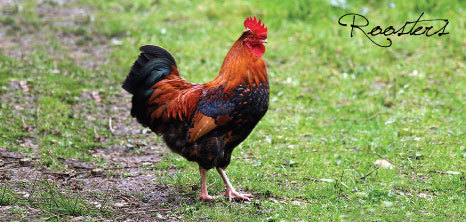|
RoostersThe rooster (gallus gallus) or cock is a male chicken and a member of the Pheasant family. Male chickens that are under one (1) year old are referred to as cockerels.
DescriptionThese male birds are much larger than the female birds and very distinguishable from them. On the head, there is a large red fleshy wattle and comb. Over the bird’s back, there are long, bright gold and bronze feathers that form a draping appearance. Long, curving feathers make up the tail section of this bird. These feathers look black in colour but almost glitter with shades of blue, green and purple when in sunlight. CharacteristicsRoosters are good at ensuring their future families are taken cared of. As such, roosters will suitably select places for hens to lay eggs. They also sit in the nesting boxes and make a patterned series of clucks that act as a form of encouragement for the hens to lay eggs. They will also go out in search of food and when found, will call the hen over to eat. This search and find for food is primarily to feed the hen and her chicks and so, a good rooster will go in search of more food and keep up his search and find until the hen is fully satisfied.
Cock-a-doodle-doo CallThis well known call that we in Barbados readily associate with the arrival of “the break of dawn” is made by these birds during their mating season. This call is twofold as it serves to attract potential females and to ward off male birds who may be thinking of potentially getting in their way. In essence, this male call is indeed a form of investment in their prospective mates.
During the day, a rooster will perch himself at an elevated place where he can keep a sharp eye out for potential predators. Roosters are polygamous and due to their inability to watch safely over all their nests, must take this stance in order to protect their hens. In the event of trouble on the horizon, the rooster will sound a particular alarm that lets predators know not to get in the way.
At the back of their lower leg, just behind and above the foot, there is a long spur that is readily used when there is a need to protect their territory.
CockfightingThis is when two gamecocks come together in a ring that is called a cockpit to fight each other. Special attention is given to these gamecocks as emphasis is constantly placed on ways of increasing their strength and stamina.
Cockfighting in Barbados, though illegal, is considered to some as a sporting tradition. As a result, there are still people across the island that get involved in these contests unknown to authorities.
|



